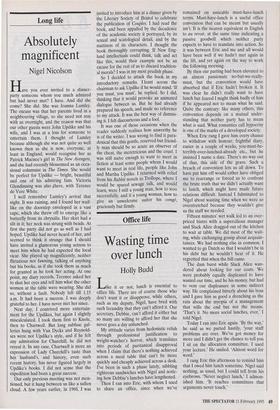Long life
Absolutely magnificent
Nigel Nicolson
Have you ever invited to a dinner- party someone whom you much admired but had never met? I have. And did she come? She did. She was Joanna Lumley. The excuse was that her parents lived in a neighbouring village, so she need not stay with us overnight, and the reason was that our other guests were John Updike and his wife, and I was at a loss for someone to entertain them. I thought of Lumley because although she was not quite so well known then as she is now, everyone, at least in England, would recognise her as Patrick Macnee's girl in The New Avengers, and she had recently blossomed as an occa- sional columnist in The Times. She would be perfect for Updike — bright, beautiful and one of his admiring fans. Victoria Glendinning was also there, with Terence de Vere White.
I well remember Lumley's arrival that night. It was raining, and I found her waif- like on the doorstep enveloped in a vast cape, which she threw off to emerge like a butterfly from its chrysalis. Her skirt had a slit in it; her neck was strung with beads. At first the party did not go as well as I had hoped. Updike had never heard of her, and seemed to think it strange that I should have invited a glamorous young actress to meet him when he had expected the local vicar. She played up magnificently, neither flirtatious nor fawning, talking of anything but his books, as if she took them as much for granted as he took her acting. At one point, my diary records, Terence asked her to shut her eyes and tell him what the other women at the table were wearing. She did so, without a fault. Nobody left till 1.15 a.m. It had been a success. I was deeply grateful to her. I have never met her since.
Next day, I contrived more entertain- ment for the Updikes, but again I slightly miscalculated. I took them first to Knole, then to Chartwell. But long subfusc gal- leries hung with Van Dycks and Reynold- ses were not Updike's style, and if he felt any admiration for Churchill, he did not reveal it. In any case, Chartwell is more an expression of Lady Churchill's taste than her husband's, and history, even such recent history, has never figured largely in Updike's books. I did not sense that the expedition had been a great success.
Our only previous meeting was not men- tioned, but it hung between us like a sullen cloud. A few years earlier, in 1968, I was invited to introduce him at a dinner given by the Literary Society of Bristol to celebrate the publication of Couples. I had read the book, and been appalled by the decadence of the academic society it portrayed, by its sexual and scatological detail, and by the nastiness of its characters. I thought the book thoroughly corrupting. If New Eng- land intellectuals could think, talk and act like this, would their example not be an excuse for the rest of us to discard tradition- al morals? I was in my most prudish phase.
So I decided to attack the book in my introductory remarks. I leant across the chairman to ask Updike if he would mind. 'If you must, you must', he replied. So I did, thinking that it would provoke an animated dialogue between us. But he had already prepared his speech, and made no reference to my attack. It was the best way of dismiss- ing it. I felt discourteous and a fool. It was one of those occasions when the reader suddenly realises how unworthy he is of the writer. I was wrong to find it para- doxical that this gentle, reserved but friend- ly man should be so acute an observer of the cheat, the meretricious and the cruel. I was still naïve enough to want to meet in fiction at least some people whom I would want to meet in real life, people like John and Martha Updike. I returned with relief from his Rabbit novels to Trollope, where I would be spared sewage talk, and would learn, were I still a young man, how to woo successfully, and if a young woman, how to give an unwelcome suitor his cone, graciously but firmly.


























































 Previous page
Previous page